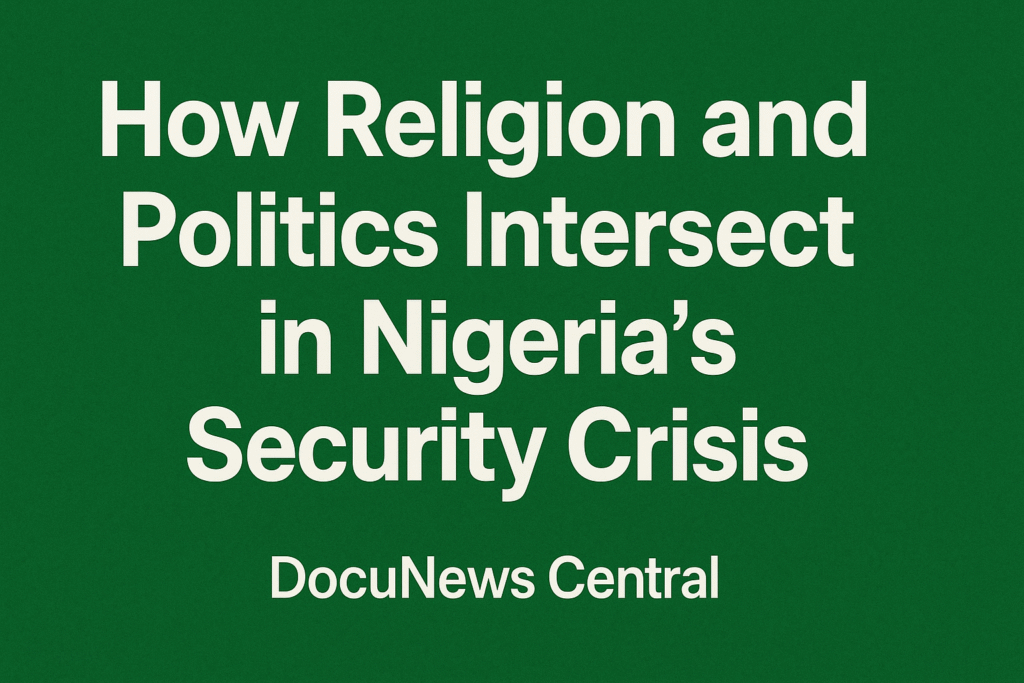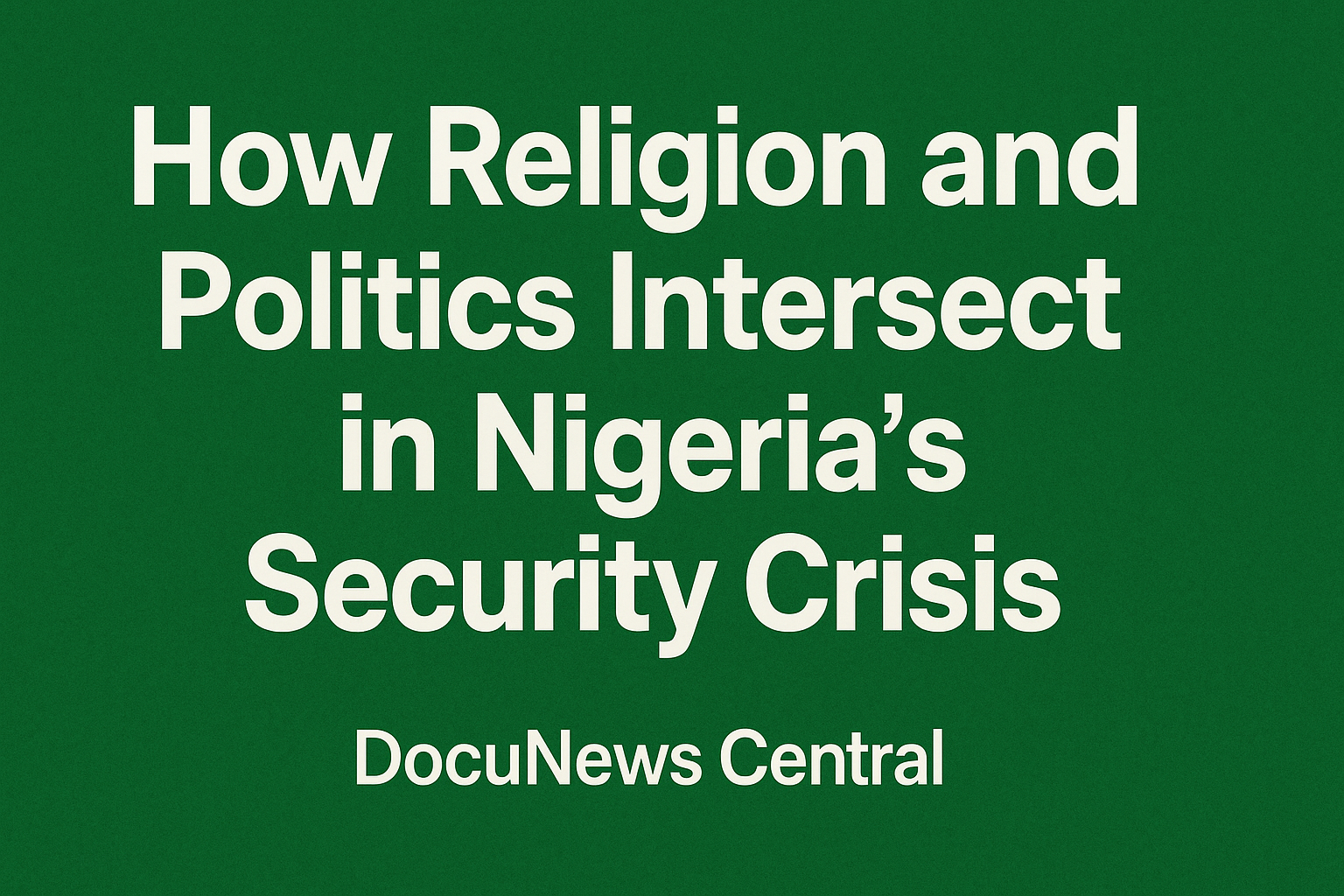
How Religion and Politics Intersect in Nigeria’s Security Crisis
Nigeria’s security challenges have persisted for decades, but in recent years, the intersection of religion and politics has made the situation increasingly complex. From insurgency in the North to ethnic-religious conflicts in the Middle Belt, and separatist tensions in the South, the influence of religion and politics on security cannot be ignored. Understanding how these two powerful forces interact is essential to grasping the roots of the nation’s instability and how lasting peace can be achieved.
The Historical Connection Between Religion and Politics in Nigeria
Religion has always played a crucial role in Nigerian society, long before independence. During colonial rule, the British indirectly empowered traditional and religious leaders, making faith a political tool. After independence, religious affiliation often became a means of political mobilization. Politicians learned to exploit faith for support, and this approach gradually deepened divisions across the country. As a result, religion has remained intertwined with governance, shaping national policies and influencing leadership contests.
In contemporary Nigeria, the struggle between political control and religious loyalty has often blurred lines of national identity. Leaders who emphasize their religious identity tend to gain trust from their followers, even when governance performance is poor. Consequently, religion has become a form of political capital used to maintain loyalty, deflect criticism, and consolidate power.
Religion as a Tool of Political Mobilization
Across Nigeria’s diverse landscape, religion frequently serves as a mobilizing instrument. During elections, candidates appeal to faith-based sentiments to gather votes. In the North, political campaigns often reference Islamic values, while in the South, Christian rhetoric is commonly used to win sympathy. This manipulation of faith has fueled division, mistrust, and in some cases, violent confrontation. Unfortunately, it has also made governance more difficult, as policies tend to reflect sectarian bias rather than national interest.
The frequent use of religion for political gain weakens democratic institutions. When political candidates are judged by faith rather than competence, corruption and inefficiency thrive. In such environments, loyalty to one’s religious group can overshadow commitment to national unity. Therefore, the blending of religion and politics continues to shape Nigeria’s fragile security architecture.
The Role of Extremism and Religious Misinterpretation
The rise of extremism in parts of Nigeria, particularly in the Northeast, demonstrates the dangerous consequences of religious manipulation. Groups such as Boko Haram emerged by distorting religious teachings to justify violence and create fear. Over time, these extremist movements expanded their reach, attacking churches, mosques, schools, and government institutions. Their actions have claimed thousands of lives and displaced millions of citizens.
Political neglect, poverty, and lack of education have made it easier for extremist ideologies to take root. Some politicians, seeking short-term gains, have turned a blind eye to the spread of radical doctrines. The inability to draw a clear line between religion and governance has further allowed insecurity to flourish, undermining development and threatening national unity.
Political Interests and the Security Establishment
Nigeria’s political class wields significant influence over the nation’s security agencies. Appointments of security chiefs often reflect political or religious considerations rather than merit. This practice not only weakens professionalism but also fosters resentment among marginalized groups. Consequently, security responses become inconsistent, and public trust in state institutions diminishes.
In some instances, political actors have been accused of sponsoring or protecting violent groups for electoral advantage. Such behavior blurs accountability and complicates counter-terrorism efforts. When security operations appear biased or politically motivated, affected communities may lose confidence in the government’s sincerity, thereby deepening mistrust and rebellion.
The Impact on Inter-Religious Relations
Religion and politics in Nigeria are deeply intertwined in a way that shapes inter-communal relations. In states where political leaders favor one faith over another, tension often arises. Minorities feel excluded, and conflicts become inevitable. Over time, this sense of exclusion grows into open hostility, leading to cycles of violence. To prevent such crises, leaders must adopt inclusive governance that recognizes all faith groups as equal partners in nation-building.
In addition, promoting dialogue between religious leaders can reduce suspicion and encourage peace. The media also plays a vital role in this regard. Responsible journalism that avoids inflaming sectarian divisions helps to stabilize communities and promote tolerance.
Efforts Toward Peace and National Reconciliation
Despite these challenges, several initiatives have been introduced to restore peace. Interfaith dialogue forums, peace commissions, and youth empowerment programs have all contributed to bridging divides. Religious leaders have also joined efforts to condemn violence and promote forgiveness. Their cooperation with government agencies has brought progress in certain regions.
However, the success of these efforts largely depends on the political will to implement fair policies. Transparent governance, equal distribution of resources, and genuine respect for diversity remain crucial for sustainable peace. Furthermore, security reforms must prioritize intelligence gathering, justice, and rehabilitation rather than vengeance.
The Way Forward: Building a Unified National Identity
For Nigeria to overcome its security challenges, it must redefine the relationship between religion and politics. Leaders should promote a sense of national identity that transcends faith and ethnicity. Civic education can also help citizens understand that political competence and moral integrity should outweigh religious affiliation. Similarly, faith-based organizations must emphasize teachings that promote peace, tolerance, and unity.
The government must also ensure that national policies are inclusive and development-oriented. When citizens see fairness in leadership, they are less likely to resort to violence. Strengthening local governance, empowering traditional rulers, and engaging the youth in community development projects can further reduce the appeal of extremism.
Media and Civil Society in Promoting Stability
Media organizations and civil society groups play an essential role in reshaping national conversations around religion and politics. Through awareness campaigns, investigative journalism, and community outreach, they can expose corruption, promote transparency, and encourage peaceful coexistence. When people have access to accurate information, manipulation becomes harder to sustain.
Fact-checking platforms like Trump Treating Nigeria with a Potential Military Action and investigative articles such as Nigerians Demand US Visa Bans for Tinubu, Wike, Akpabio, Shettima, Umahi Over Corruption have demonstrated how credible reporting can counter misinformation that fuels conflict. By ensuring that news stories remain objective and balanced, media professionals can help dismantle narratives that promote religious hatred or political manipulation.
Lessons from Other Nations
Many countries with similar religious diversity have faced comparable challenges. Nations that managed to separate religion from governance successfully reduced sectarian conflicts. Nigeria can learn from their experiences by enforcing constitutional secularism and encouraging inclusive policies. The key lesson is that peace thrives when leaders prioritize justice over division.
When religion is respected but not politicized, it becomes a force for unity. On the other hand, when it is exploited for personal or political gain, it turns into a source of destruction. Nigeria’s future stability therefore depends on maintaining this delicate balance.
Conclusion
Religion and politics in Nigeria’s security crisis remain deeply interconnected. While faith has the power to unite, political manipulation of religion continues to breed division and violence. Achieving lasting peace requires genuine efforts from both religious and political leaders to prioritize national interest above sectarian loyalty. If leaders and citizens work together to promote inclusion, fairness, and dialogue, Nigeria can overcome its security challenges and chart a course toward a peaceful future.
Related Posts
- Trump Treating Nigeria with a Potential Military Action
- FG Rejects US President Donald Trump’s ‘Country Of Concern’ Designation Over Genocide Claims
- Nigerians Demand US Visa Bans for Tinubu, Wike, Akpabio, Shettima, Umahi Over Corruption










Your article helped me a lot, is there any more related content? Thanks! https://www.binance.com/sl/register?ref=I3OM7SCZ
Your article helped me a lot, is there any more related content? Thanks!